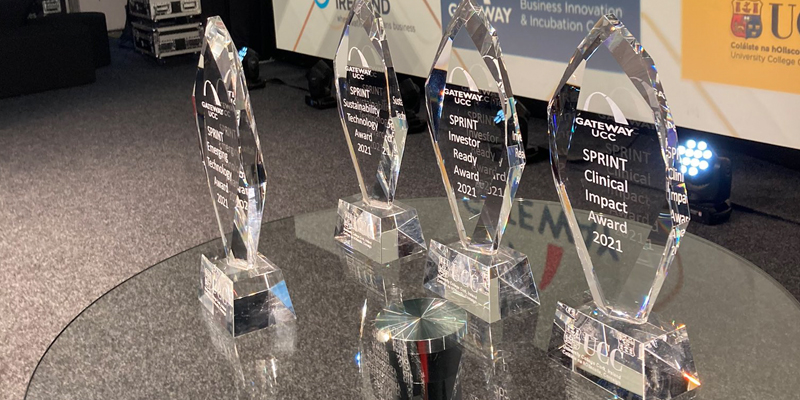Gateway UCC SPRINT Awards 2021

Researcher-led start-ups at University College Cork have raised more than €50m of public and private investment in the past eight years, with 60 companies now employing more than 400 people.
GatewayUCC, part of UCC Innovation, made the announcement yesterday as it revealed the winners of its fifth Sprint Awards for 2021. Since 2012, GatewayUCC's IP-based companies have contributed more than €22m a year in salaries to the local economy.
Sprint is designed to support early-stage start-ups working on technologies generated in UCC by UCC researchers and entrepreneurs. This year will see 20 researcher-led projects sign up for the Sprint programme — an increase of 50% from last year. Some 40% of that cohort are female founders, which represents the largest intake of female founders in the programme’s history.
On the programme, pre and early-stage start-ups will be working with successful business mentors who will help to bring their businesses from the idea stage through to the eventual commercialisation. Head of GatewayUCC and the Sprint Programme, Myriam Cronin, said: “The businesses and researchers supported by GatewayUCC have continued to innovate and evolve over the past 12 months, and have flourished, given the challenges posed by the global pandemic.
Director of UCC Innovation Dr Rich Ferrie said: “UCC research continues to provide a wealth of opportunities to spin-out exciting new technology companies, and I’m delighted that over 400 high-value jobs have been created in the region through GatewayUCC."
The winners of the 2021 Sprint Awards are:
- Eric Moore — Smart Probe
- Ken Nally and Ciaran Lee — ProtectBiotics
- Sana Konugolu — BiopixS
- Andrey Tiuftin — Biocoat/Sustaincoat
Dr Eric Moore from the School of Chemistry and Tyndall National Institute was awarded the SPRINT Clinical Impact Award for SMARTProbe.
“It takes too long for breast cancer patients to receive a diagnosis”. Millions of women worldwide undergo breast biopsies following suspicious mammograms. Up to 80 % of these biopsies are not indicative of cancer. Women suffer significant apprehension and anxiety waiting for these negative pathology results and can be waiting up to 10-12 days to be told of the outcome. This key issue of waiting for the diagnosis and the psychological impact should not be underestimated. Clinicians will use the SMARTProbe technology because it will perform real time detection of breast cancer during biopsies. It would provide radiologists with immediate information to make a better informed decision about whether the tissue is benign or suspected of cancer. There would be huge benefits to women as the detection would now be in minutes instead of days.
SMARTProbe is an adjunct technology that can be used in conjunction with existing or emerging optical techniques such as ultra sound or advances in imaging. It has a special sensor incorporated into the tip of a core biopsy needle. The needle‐probe will be inserted into the breast under ultrasound guidance to the lesion of interest. The technology can be used to “taste” the suspicious lesion to determine its malignant status. A traffic light system will inform the radiologist of the nature of the lesion as either healthy, benign or malignant. If a biopsy is desired, the core biopsy needle can be fired at the exact location where a suspicious reading has been indicated and a sample obtained. If a healthy or benign signal is indicated the radiologist may chose not take a biopsy and spare the patient the potential risk from the procedure (cutting of tissue, bleeding and risk of infection) and adopt a different management process. It would therefore offer a more efficient clinical pathway for breast cancer detection and diagnosis.
Analytical & Biological Chemistry Research Facility (ABCRF)
Saoráid Taighde Ceimice Anailísí agus Bitheolaíochta
Contact us
Pharmacy Building, University College Cork, T12 YN60.
